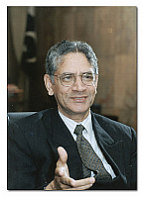Winning the war against terror
Published in the Peoria
Journal Star on July 4'th , 2004
The United States' relations with the Islamic world have been troubled for some time, but the war on terrorism seems to have damaged them irretrievably. At least this is the popular perception on the other end of the divide. The American approach to terrorism reflects a paradox. On one hand, terrorism is being treated as if it were a rootless entity that has no origin or cause and can be defeated simply through overwhelming force. And on the other, a dangerous war hysteria has led to the profiling of Islam as a universal creed of terrorism. This obscures the reality of terrorism and of Islam, making the war on terrorism look like a war on Islam, to the detriment of America's anti-terror campaign and its foreign policy interests. Yes, there are certain extremists and militants among Muslim societies who give strength to their political objectives by basing them on some religious values. But these represent neither true religion nor a social consensus. Basic religious values of all great religions are good, and they do not endorse or condone violence against innocent citizens. If Islamic societies seem to be in disorder, it is largely because we live in a disordered world. There is an urgent need not only to understand Islam but also those who profess or practice this faith, especially to understand their problems and world view, which may be associated in some way with religion but is neither germane nor confined to it. Indeed, it is not religion but people who spread terrorism. As has happened so often in history, issues may seem religious but are not often so; they can be political issues entangled with religion. The Islamic societies have been in conflict in their search for national identities, political stability and ways to successfully absorb modern liberal values. And historically the West, especially the U.S., is believed to have complicated this search by becoming a party to the conflict. Islamic peoples' transition to free, democratic and modern societies has been impeded or sabotaged first by the long period of colonialism from which hardly any part of the Islamic world escaped, and by three reactionary or status quo forces in their contemporary historical experience: clergy, feudalism/tribalism, and weak institutional architecture. Cold war, oil politics and anti-communism also played no small part by giving the West a common cause with the ruling conservative elite, thus helping to reinforce the status quo. Social change was blocked as a mutual interest to ensure a stable order. Modernization of these societies was thus sacrificed to strategic and economic interests of the West and personal, dynastic or oligarchic power interests of the local ruling elite. U.S. confidence in reforming these societies may therefore be misplaced because it is seen, fairly or unfairly, as part of the problem, not the solution. Iraq's case was unique; the hatred for Saddam and privations of life may have surpassed anti-Americanism. The Iraqis may have welcomed the American troops initially, but there is a fine dividing line between liberators and occupiers. In time these perceptions start co-existing in the minds of a majority of the population. People may want democracy, but democratic aspirations also express themselves strongly in nationalism. In any case, democracy is home-grown; it's not a takeout menu item. U.S. intentions to democratize Iraq and the rest of the Middle East may be genuine from Washington's perspective. But given its past and existing record of supporting undemocratic regimes, nobody in the region takes these intentions seriously. In any case, where is the United States going to find billions of dollars more to replicate the experience of "democratizing" Iraq in other Middle Eastern countries, as President Bush has suggested? Democracy comes through hard work, not through talk. It requires a sustained commitment to social change and political reform - indeed a complex process, given each country's social structure, historical experience and the strength or weakness of forces that are resistant to change. The United States can help by aligning itself with forces of change rather than with those opposed to it. Right now the U.S. is aligned with wrong forces in most places, and that is what is blocking democratization. The Iraq example will not be relevant to other countries because the dictatorship there was harming U.S. interests, so it was easy to move against it in the name of democracy. The real test of American commitment to a democratic Middle East will come where the U.S. has to move against undemocratic but friendly regimes. Whatever the case, the West, particularly the United States, has angered the entire Islamic world by the Iraq war and by treating religion and terrorism indistinguishably. What is needed is a recognition by the West and by the Islamic world that terrorism has been caused by the combined policy failures of both. A successful fight against terrorism will need their mutual cooperation and pursuit of a comprehensive strategy. Establishment of mutual trust and confidence is requisite to such cooperation. Only then will the United States be able to re-establish influence in the Islamic world to facilitate positive change. Temperatures need to be lowered, and the hostile rhetoric needs to be tempered. The current needs de-escalating. The universal distrust of Muslims, whether citizens of other countries or law-abiding and proud Americans as any, is harmful to this effort. We need greater harmony among various communities and faiths in this country, for terrorism is a common enemy of us all. Touqir Hussain is a retired Pakistani ambassador and former diplomatic adviser to Pakistan's prime minister. Having moved to Peoria last year to be near relatives, he writes for a number of Pakistani newspapers.
| 


